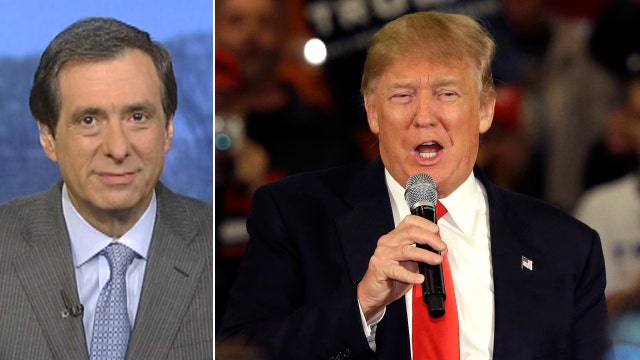Kurtz: Can Trump change his tune?
'MediaBuzz' host reacts to critics saying Trump's strengths have become his weaknesses
After Donald Trump knocked Marco Rubio out of the race in Florida, he used what should have been a triumphant news conference to take a few whacks at the press.
There was the unnamed cable pundit who he said didn’t understand delegate math, and then the shot at the “disgusting” reporters in the back of the room at Mar-a-Lago.
He couldn’t resist.
I asked Trump about this in our latest interview, saying that many people ask, “Can’t he tone down the insults a little bit and start acting more presidential?”
Trump responded by saying he had been running against 16 rivals—it was now down to three—“and I was being attacked from every angle imaginable…I had to be tough and I had to be sharp and I had to be nasty in some cases because they were nasty.”
The candidate made clear that he had no intention of changing his style—which was, after all, what enabled him to defy all the doom-and-gloom predictions and seize control of the Republican race. But it is now apparent that Trump’s strengths are also his weaknesses.
He’s a fighter, a brawler, a counterpuncher. And that, in part, is how he trampled all these governors and senators and became the GOP front-runner. But eventually, voters want to see a more sober side of a potential commander-in-chief. And Trump has had difficulty making that pivot.
He did tell Maureen Dowd he made a “mistake”—a very rare word for him—in retweeting a rather unflattering picture of Ted Cruz’s wife next to a photo of his own wife. But as Maureen wrote, “You could hear how hard it was for him to say the words.”
Some of his advisers have been urging him to dial it down, not to respond to every insult, not to pick fights, not to do so many interviews—in short, to rise a bit above the fray. Their view is that this is how he rode to fame in tabloid-tough New York, and it is hard for him to abandon that persona.
Trump still feels the need to deliver a slam after every slight. He is still largely winging it. He hasn’t given a series of policy speeches, other than the one at AIPAC. And he’s had a series of missteps: A Twitter threat to “spill the beans” on Heidi Cruz. Backing off his abortion comments to Chris Matthews. Backing off subsequent abortion comments to John Dickerson. Making derogatory remarks about Michelle Fields after a battery charge against his campaign manager.
Newt Gingrich made this point on Fox the other day: “All of his strengths now are weaknesses because they’re not the characteristics of a potential president, they were the characteristics of an insurgent candidate, so he’s got a big challenge.”
Joe Scarborough, who’s done many interviews with Trump, said on his show that The Donald should stay quiet, stop saying yes to every interview and take a more measured approach to the campaign.
As a journalist, I would never advise a candidate not to do interviews. The risk of a stumble is far outweighed by the ability to drive the media agenda.
But a presidential candidate has to pick his fights. And not worry so much about what every loudmouth on cable says. And project an image that he is focused on big-picture questions and has firm beliefs on those issues.
If Ted Cruz wins Tuesday in Wisconsin, where he is ahead by 10 points, the media will declare that Trump is in a tailspin. They will say female voters are turning on him in droves. And he won’t have an opportunity to score a major delegate win until New York votes at month’s end.
What will be true, if Trump loses Wisconsin, is that his chances of getting to 1,237 delegates before the convention will be diminished.
Trump has survived every media firestorm since he got into the race last June. But an insurgent presidential candidate needs a second act. The question is whether Trump has the discipline to modify his approach—or whether that will sap his original source of strength.













































